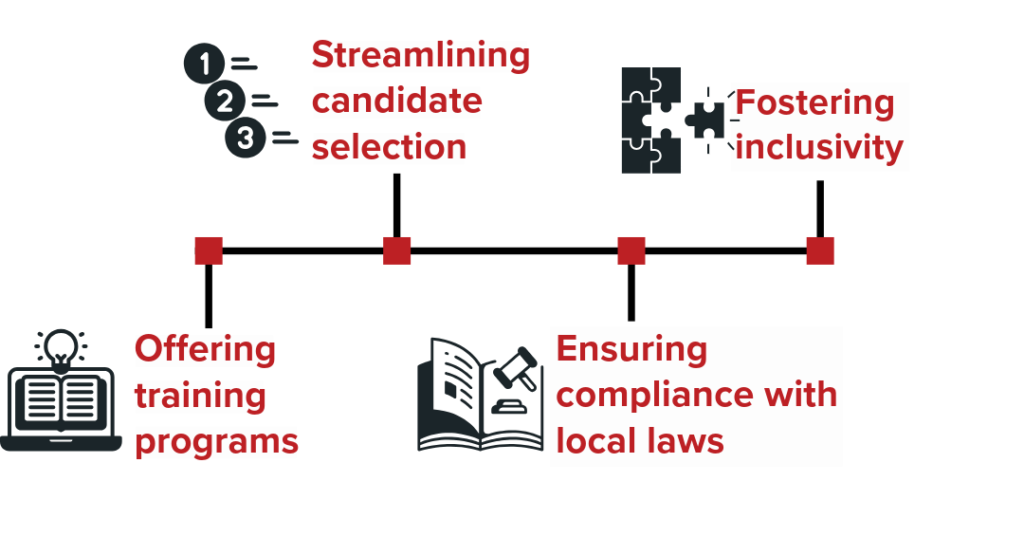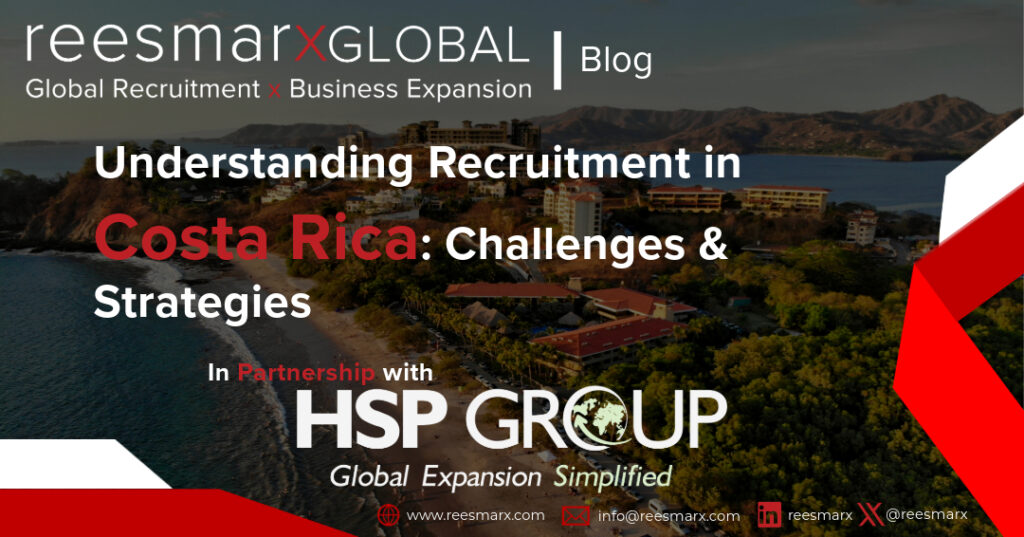Recruiting talent in Costa Rica presents a mix of opportunities and challenges for businesses looking to expand and strengthen their workforce. The country’s strategic location and skilled labor pool are attractive, yet recruiters must navigate various obstacles to find and retain the right talent. In this blog, we’ll explore the recruitment landscape in Costa Rica, outlining the key challenges businesses face and offering insights into effective strategies to thrive in this dynamic market.

Recruitment Challenges in Costa Rica
High Unemployment Rates
With an unemployment rate of 11.7%, the sheer volume of candidates can make the hiring process overwhelming, complicating the identification of the best fit for roles.
Changing Salary Standards
Costa Rica has seen significant growth as a region for North American companies, causing a rise in salaries. Traditional salary surveys are no longer as accurate, and to attract and retain top talent, it is crucial to offer competitive compensation packages to avoid losing candidates to other opportunities or counteroffers.
Labor Market Insecurity
Certain groups, such as young professionals, part-time workers, rural employees, and immigrants, face unstable employment conditions and limited access to benefits.
Aging Workforce Discrimination
Individuals over 45 often encounter misconceptions about their skillsets, impacting their opportunities despite their extensive experience.
Tight Labor Market for Skilled Roles
Industries such as IT, finance, and customer service deal with fierce competition for highly skilled professionals, creating a challenging environment for recruiters.
Legal and Regulatory Compliance
Employers must navigate complex labor laws that include mandatory benefits, proper termination procedures, and anti-discrimination regulations.
Language Proficiency Gaps
Although English is widely used in business, varying levels of proficiency among candidates can pose challenges for roles requiring advanced communication skills.
Integration of Foreign Workers
Lengthy and costly processes for work permits and residency can slow the onboarding of international talent.
Strategic Approaches to Recruitment
Despite these challenges, Costa Rica remains a hub of opportunity for organizations with the right recruitment strategies. To succeed, businesses should focus on developing tailored hiring processes that address these unique challenges. Key initiatives include:

A significant point for employers is the 13th-month salary, or “aguinaldo,” a mandatory bonus paid in December that helps cover holiday expenses. This detail, familiar to those who regularly recruit in Costa Rica, may be overlooked by companies expanding into the region for the first time. By approaching recruitment strategically and with awareness of cultural and legal factors, businesses can attract and retain top talent while building a robust employer brand in the Costa Rican market.
Your HR Guide in Costa Rica
Navigating the hiring and management of employees in Costa Rica requires understanding a clear legal framework. The legislation imposes minimum standards and mandatory employer obligations that must be followed. Costa Rica also operates several Collective Bargaining Agreements applicable to various industries. Familiarity with these laws is essential for compliance and cultivating a positive workplace.
Essential Legal & Compliance Aspects
Right to Work:
Employers must verify that all employees have the right to work in Costa Rica before their start dates. Acceptable documents include valid passports, visas, and work permits, which employers must retain and track.
Non-Discrimination:
Employment practices must avoid discrimination based on protected characteristics as per the Costa Rican Labor Code.
Background Checks:
Foreign nationals seeking work permits must present a criminal record check from their home country.
Main Types of Employment Contracts
Permanent Employment:
Ongoing employment without an end date, offering full employment rights.
Fixed-Term Employment:
Employment for a specific period or project, with rights similar to permanent employees.
Independent Contractors (IC):
Registered self-employed individuals or businesses hired for specific tasks, who manage their taxes and must not be misclassified as de facto employees.
Employee Benefits and Incentives
Statutory Sick Pay (SSP):
Employees who have contributed to social security before illness are entitled to paid sick leave, with employers required to pay at least 50% of salary for the first three days; the remainder is covered by the Social Security Fund.
Public Holidays:
Costa Rica observes 11 paid public holidays annually, with 2 additional holidays granted but not mandated for pay.
Social Security Contributions
Social Security:
Employees enroll in the Caja Costarricense de Seguro Social (CCSS or Caja) through their employer, with employers contributing around 27% of gross salaries and employees around 9%.
Pension Contributions:
Despite the generous replacement rates Costa Rican contribution rates are quite low by international standards. CCSS’s contibution rate is a total of 7.5 percent, split between employees (2.5 percent), employers (4.75 percent), and the government (0.25 percent).

How reesmarxGLOBAL Helps Clients Succeed in Costa Rica
For businesses like reesmarxGLOBAL, helping clients succeed in Costa Rica requires a comprehensive understanding of local regulations, cultural nuances, and the unique challenges of the labor market. reesmarxGLOBAL specializes in sectors such as IT, manufacturing, and other niche industries, where demand for skilled talent is high, yet competition remains intense. By leveraging expertise in recruitment strategy, compliance with Costa Rica’s complex labor laws, and awareness of cultural expectations, reesmarxGLOBAL empowers businesses to navigate the intricacies of the Costa Rican workforce.
With Costa Rica’s tight labor market for skilled roles and rising salary expectations, adapting to local demands and legal requirements is essential for building a competitive and compliant workforce. reesmarxGLOBAL provides tailored recruitment solutions, including guidance on mandatory benefits such as the 13th-month-salary (aguinaldo), strategies fostering inclusivity, and effective approaches to attract and retain top talent. By aligning recruitment strategies with Costa Rica’s unique market dynamics, reesmarxGLOBAL ensures businesses can achieve sustainable success in this dynamic and growing economy.
How HSP Group Helps Clients Succeed in Costa Rica
HSP can help you navigate the complex regulatory environment in Costa Rica and can offer hands-on HR expertise. Their managed services and technical consulting were designed to help you expand with ease. Backed by GateWay, our pioneering global expansion management (GXM) system, HSP brings an unparalleled focus on the customer experience. By unifying everything you need for cross-border success on a single platform, you can effortlessly and compliantly manage your international footprint.
Conclusion
Costa Rica offers immense opportunities for businesses seeking to expand, but it also presents unique challenges that require careful navigation. From navigating labor laws, mandatory benefits, and termination procedures to addressing talent shortages and evolving employee expectations, companies must be equipped to handle a highly competitive and regulated environment. Understanding Costa Rica’s intricate legal framework, embracing its work culture, and providing competitive compensation and benefits are critical steps toward long-term success.

The HSP Group & reesmarxGLOBAL partnership
HSP Group and reesmarxGLOBAL have established a strong partnership, effectively supporting clients in their expansion into new regions. HSP Group specializes in employment, HR, and payroll management, while reesmarxGLOBAL focuses on talent acquisition and headhunting. The synergy between recruitment firms and employment solution providers is often overlooked, yet it is crucial for several reasons.
One significant advantage is the enhanced transparency in processes and communication. As clients venture into unfamiliar territories, they may not know the right questions to ask or the obstacles they might face. By collaborating closely, these two types of firms can proactively identify potential challenges and opportunities, ensuring a smoother transition and a more informed approach long before clients arrive in their new markets.






